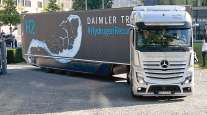Natural Gas Engines a Niche Product, Daum Says, and Daimler Has No Plans to Make Them
OXON HILL, Md. — Expressing some skepticism about the near-term strength of the market for natural-gas engines in heavy-duty trucks, Daimler Trucks’ chief U.S. executive said the truck maker will continue using Cummins Inc. engines rather than developing its own natural-gas power plants.
Daimler’s Freightliner Trucks, for example, will keep Cummins as a supplier of NG engines, contrary to the truck maker’s general policy of increasing the sale of in-house components and systems to customers.
At a press event here May 30, Martin Daum, CEO of Daimler Trucks North America, described NG trucks as a niche market for now.
“Look at the U.S. market for Class 6-8 trucks in 2012. That should be about 300,000 vehicles” this year, but only 2,000 of them — one truck out of every 150 sold industrywide — will use natural gas, Daum said.
He also said he expects DTNA to sell 50% of those trucks.
Daum and other DTNA executives spoke at the press event about their commitment to increasing trucks’ fuel economy, but doing it by improving diesel-fueled engines.
“If given a choice of doing cutting-edge diesel technology or natural gas, we went with cutting-edge diesel,” Daum said in an interview with Transport Topics editors.
Daimler AG, Stuttgart, Germany, bought Freightliner in 1981 and Detroit Diesel Corp. in 2000. Daum is in charge of both units and earlier this year renamed DDC to simply “Detroit,” and added axles and transmissions to its menu.
He said optimizing the drivetrain as a large single unit is important both for fuel economy and profitability as the engine, transmission and driveshaft account for about 50% of a truck’s value.
As for natural gas, though, Daum called Cummins “a great partner” and said “a proprietary solution only makes sense if you have a better offering.”
Natural-gas power for trucks was among the main themes of the Mid-America Trucking Show in March. All four of North America’s heavy-duty truck makers are involved in it, and the Cummins-Westport engines involving Westport Innovations are the main source.
However, Volvo Trucks recently said it is developing its own NG-fueled engine with Westport, and Navistar Inc. said it is developing a diesel-injection NG engine with Clean Air Power Ltd.
The Cummins-Westport engines use pure natural gas, which requires a spark for combustion, whereas Volvo and Navistar are working on diesel injection, which splashes diesel into natural gas, allowing for combustion through compression, the traditional diesel method.
Asked about the danger of Navistar coming to market with a different technology that might be better, Daum scoffed. “Don’t ask me about Navistar, I have no clue as to how they will build a world-class engine like this. They have a mess now with their own engines. So look at what they actually deliver and not just what they announce,” he said.
Daum also urged caution for enthusiasm about liquefied natural gas, the super-cold alternative to compressed natural gas, both of which can be used to power trucks.
Natural gas is mainly methane and, if it escapes into the atmosphere unburned, is 20 times more active as a greenhouse gas than diesel, said Wilfried Achenbach, DTNA senior vice president for engineering and technology.
LNG is not highly regulated now, Daum said, because sales of it are low, but that can change. “Regulation will probably kick in when it gets to 10% of the market,” he said.




